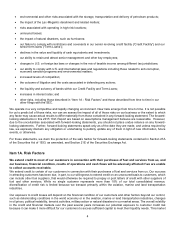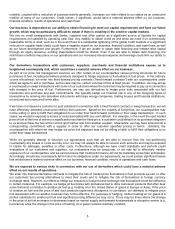World Fuel Services 2015 Annual Report Download - page 19
Download and view the complete annual report
Please find page 19 of the 2015 World Fuel Services annual report below. You can navigate through the pages in the report by either clicking on the pages listed below, or by using the keyword search tool below to find specific information within the annual report.14
Changes in U.S. or foreign tax laws could adversely affect our business and future operating results.
We are affected by various U.S. and foreign taxes, including income taxes and taxes imposed on the purchase and sale of
aviation, marine and land fuel products, such as sales, excise, value added tax, energy, environmental and other taxes.
From time to time, we may also benefit from special tax concessions in certain jurisdictions. Changes in U.S. and foreign
tax laws, our failure to comply with such laws or the loss of tax concessions could adversely affect our business, financial
condition, results of operations and cash flows.
Furthermore, significant judgment is required in determining our worldwide provision for income taxes. In the ordinary course
of our business, there are many transactions and calculations where the ultimate tax determination is uncertain. We are
regularly under audit by tax authorities and, although we believe our tax estimates are reasonable, the final determination
of tax audits and any related litigation could be materially different from our historical income tax provisions and accruals.
The results of an audit or litigation could have a material effect on our financial statements in the period or periods for which
that determination is made.
Finally, we earn a significant amount of our operating income from outside the U.S., and any repatriation of funds currently
held in foreign jurisdictions to the U.S. may result in higher effective income tax rates for the Company. Further, recent
developments, including proposals to change U.S. income tax laws regarding how U.S. multinational corporations are taxed
on foreign earnings, investigations by the European Commission on illegal state aid, the project by the Organisation for
Economic Co-operation and Development on Base Erosion and Profit Shifting and other initiatives, could adversely affect
our worldwide effective tax rate, if enacted. Although we cannot predict whether or in what form any changes will be made,
if enacted they could have a material adverse impact on our income tax expense, financial condition, results of operations
and cash flows.
Fluctuations in foreign exchange rates could materially affect our financial condition and results of operations.
The majority of our business transactions are denominated in U.S. dollars. In certain markets, however, payments to some
of our fuel suppliers and from some of our customers are denominated in local currency. We also have certain liabilities,
primarily for local operations, including income and transactional taxes, which are denominated in foreign currencies. This
subjects us to foreign currency exchange risk. Although we generally use hedging strategies to manage and minimize the
impact of foreign currency exchange risk when available, these hedges may be costly and at any given time, only a portion
of this risk may be hedged. Accordingly, our exposure to this risk may be substantial and fluctuations in foreign exchange
rates could adversely affect our profitability.
In addition, many of our customers are based outside of the U.S. and may be required to purchase U.S. dollars to pay for
our products and services. A rapid depreciation or devaluation in currency that affects our customers could have an adverse
effect on their operations and their ability to convert local currency to U.S. dollars in order to make required payments to us.
This could, in turn, increase our credit losses and adversely affect our business, financial condition, results of operations
and cash flows.
Our cash equivalents and investments are subject to risks that may cause illiquidity and losses from declines in value.
Our cash equivalents, principally consisting of overnight investments, bank money market accounts and bank time deposits
are subject to credit, liquidity, market and interest rate risk, which can be exacerbated by volatility in the capital markets.
Adverse changes in this respect can result in the decline of the fair value of our cash equivalents and therefore our liquidity,
which could materially affect our business, financial condition, results of operations and cash flows.
Current and proposed derivatives legislation and rulemaking could have a material adverse effect on our business.
The Dodd Frank Wall Street Transparency and Accountability Act of 2010 (the “Act”) provides for federal regulation of the
over the counter (“OTC”) derivative markets both for commodities and securities, and gives the U.S. Commodity Futures
Trading Commission (“CFTC”) and the SEC broad authority to regulate such markets and their participants. This includes,
among others, derivative transactions linked to crude oil, refined products and natural gas prices. The CFTC and the SEC
are continuing to consider, finalize and implement rules governing, among other things, where swaps are transacted (on
exchange versus off exchange); how they are transacted (cleared versus uncleared; margined versus unmargined); the
differing responsibilities of those who participate in OTC derivatives (end users, swap dealers, major swap participants);
and the application of cross-border rules in the global derivatives markets. Further, regulations setting limits on the size of
a party’s derivative positions in major energy markets were adopted by the CFTC but vacated after a successful challenge
in federal court. In November 2013, the CFTC re-proposed new position limits rules, which would limit trading in options,
futures, and swaps contracts related to certain agricultural, metal, and energy commodities, including energy commodities
in which we currently engage in derivative transactions. Such rules have not been finalized, and we cannot currently predict
whether or when the re-proposed rules will be adopted, in what form the rules will be adopted, or the effect of the final rules,
























